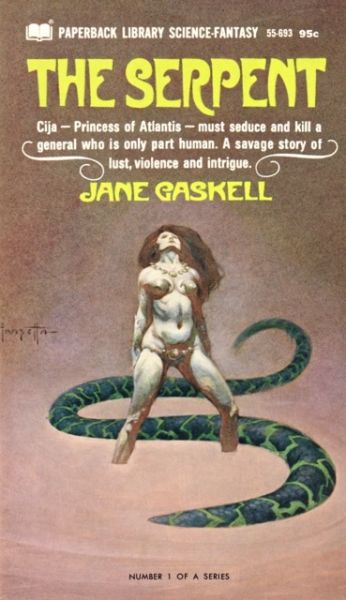Like a Bird in a Nest
The Serpent (Atlan, volume 1)
By Jane Gaskell

25 Nov, 2018
Because My Tears Are Delicious To You
0 comments
1963’s The Serpent is the first volume in Jane Gaskell’s Atlan series.
Long, long ago, before Atlan and Mu sank, when humanity still lived alongside the brontosaurus, Cija was raised in an isolated palace by servants of her Dictatress mother. Now seventeen, Cija chafes at the restrictions under which she must live.
The Dictatress descends upon the palace and Cija’s life changes in an instant.
All her short life, Cija has been led to believe society is composed entirely of women, that humans reproduce by (somehow) laying eggs. This is not entirely accurate. In fact, it is a complete lie1. Society is composed of both women and men. Cija will soon gain personal knowledge of this, because her mother is going to hand Cija over to Zerd, a half-reptilian general whose foreign army is traversing Cija’s small kingdom.
The Dictatress is taking a calculated risk, as dark prophecies predict that Cija will be the doom of her kingdom. Prudence would dictate that Cija either be confined to the palace in total isolation or better yet, hit over the head with a rock and quietly buried. But the Dictatress is convinced that Zerd is a greater threat than the catastrophe that Cija will bring on the kingdom if she lives. Accordingly, the Dictatress gives her daughter to Zerd as a hostage.
But Cija isn’t just a hostage. She’s been told to seduce Zerd and then kill him. It’s quite a task for a cosseted woman who had no idea that men even existed until a few days ago, but Cija has no choice but to accept it.
Cija and a few other hostages are a guarantee that Zerd’s army will not be harassed as they march across the kingdom. There’s no plan to release the hostages at the border. They are to follow the army, never to be seen again.
Cija manages to get Zerd’s attention, thus enraging all the other women vying for his affections. Her attempts to seduce him are somewhat less successful. She never gets around to murdering him; she makes an ill-advised attempt to flee.
Her guide betrays her. Cija is handed over to the governor of a small town, who treats her as one might expect a young and lovely captive will be treated in barbarian lands. Her travails are only just beginning.
~oOo~
Jane Gaskell wrote her first novel, Strange Evil, when she was just fourteen; it was published when she was sixteen. Consider that, anyone who is troubled over their inability to hit unrealistic life goals.
Readers may be momentarily misled by the book’s sympathetic portrayal of effeminate Lel, a boy who wants to be a girl. How sweet, that Gaskell was ahead of her time in her treatment of LGBT folks! But Lel soon encounters a collective of brutish women-hating gay men who will disabuse the reader of any illusions as to Gaskell’s ally credentials.
Although the novel begins with assurances that the events in it are true, that Mu and Atlantis really existed at one point, that our moon is but a recent addition to the night sky, one soon begins to suspect that this series is not quite as firmly seated in historical fact as its author would have us believe. In fact, “Gaskell’s world building is completely bonkers” might be somewhat closer to the truth. I suppose the Gaskell version of world history is no more ludicrous than Robert E. Howard’s.
It’s also bonkers to choose someone raised in isolation and ignorance to handle a difficult task on which their nation’s fate depends. In fact, it’s completely unreasonable. It does not reflect badly on poor Cija that she fails so utterly. The Dictatress has at least two excuses for trying it; the first is that she seems like the sort of autocrat who assumes that whatever she wants to happen will happen. The second is that Cija may not have been intended to survive her mission (which would deal with the little matter of the prophecy of doom).
Although Cija does sometimes hold her own, for the most part she is a hapless, naïve non-combatant thrown into a violent, abusive world, a world in which people like her are pawns to be used and discarded. She very quickly learns to distrust men, for all the good it does her.
The picaresque plot meanders from one predicament to another; it is enlivened with more rapes than I would like, but that was a genre trope in those days (and still in ours, alas). Nevertheless, the book is still readable for its vivid imagery.
The Atlan books were quite popular in their day. Having recently reread both Tanith Lee and Gaskell, I suspect that Lee’s early books were influenced by Gaskell. As were the books of other authors. It’s surprising, then, that the Atlan series seems to have descended very suddenly into obscurity in the mid-1980s. Tastes evolve, I suppose, and the niche the Atlan books filled appears to have vanished. Which will not stop me from reviewing more Gaskell.
As far as I can tell, The Serpent and the series of which it is a part are utterly out of print. This seems a pity and rather surprising. In a world where ebook reprints abound, surely there is room for Gaskell?
1: Thus denying the world the great work of parthenogenic monotreme-based sword and sorcery it deserves.
